See also
- C-MAC, a European television standard
CMAC is the Cipher-based Message Authentication Code, a cryptographic algorithm.
CMAC may also refer to:
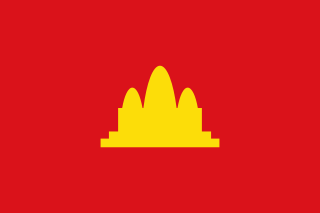
The Khmer Rouge is the name that was popularly given to members of the Communist Party of Kampuchea (CPK) and by extension to the regime through which the CPK ruled Cambodia between 1974 and 1979. The name was coined in the 1960s by then Chief of State Norodom Sihanouk to describe his country's heterogeneous, communist-led dissidents, with whom he allied after his 1970 overthrow.

Stormwater, also written storm water, is water that originates from precipitation (storm), including heavy rain and meltwater from hail and snow. Stormwater can soak into the soil (infiltrate) and become groundwater, be stored on depressed land surface in ponds and puddles, evaporate back into the atmosphere, or contribute to surface runoff. Most runoff is conveyed directly as surface water to nearby streams, rivers or other large water bodies without treatment.

James Sacra Albus was an American engineer, Senior NIST Fellow and founder and former chief of the Intelligent Systems Division of the Manufacturing Engineering Laboratory at the National Institute of Standards and Technology (NIST).

Unexploded ordnance, unexploded bombs (UXBs), and explosive remnants of war are explosive weapons that did not explode when they were employed and still pose a risk of detonation, sometimes many decades after they were used or discarded. When unwanted munitions are found, they are sometimes destroyed in controlled explosions, but accidental detonation of even very old explosives also occurs, sometimes with fatal results.
TC, T.C., Tc, Tc, tc, tC, or .tc may refer to:

Permeable paving surfaces are made of either a porous material that enables stormwater to flow through it or nonporous blocks spaced so that water can flow between the gaps. Permeable paving can also include a variety of surfacing techniques for roads, parking lots, and pedestrian walkways. Permeable pavement surfaces may be composed of; pervious concrete, porous asphalt, paving stones, or interlocking pavers. Unlike traditional impervious paving materials such as concrete and asphalt, permeable paving systems allow stormwater to percolate and infiltrate through the pavement and into the aggregate layers and/or soil below. In addition to reducing surface runoff, permeable paving systems can trap suspended solids, thereby filtering pollutants from stormwater.

The Clean Water Act (CWA) is the primary federal law in the United States governing water pollution. Its objective is to restore and maintain the chemical, physical, and biological integrity of the nation's waters; recognizing the responsibilities of the states in addressing pollution and providing assistance to states to do so, including funding for publicly owned treatment works for the improvement of wastewater treatment; and maintaining the integrity of wetlands.
The human rights situation in Cambodia is facing growing criticisms both within the country and from an increasingly alarmed international community. After a series of flagrant violations against basic human rights a feeling of incertitude regarding the direction the country is emerging, sometimes comparing the situation to a newborn Burma.
TRE or Tre may refer to:

A retention basin, sometimes called a retention pond,wet detention basin, or storm water management pond (SWMP), is an artificial pond with vegetation around the perimeter and a permanent pool of water in its design. It is used to manage stormwater runoff, for protection against flooding, for erosion control, and to serve as an artificial wetland and improve the water quality in adjacent bodies of water.
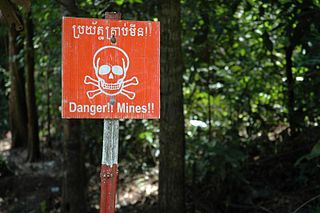
Cambodia is a country located in Southeast Asia that has a major problem with landmines, especially in rural areas. This is the legacy of three decades of war which has taken a severe toll on the Cambodians; it has some 40,000 amputees, which is one of the highest rates in the world. The Cambodian Mine Action Centre (CMAC) estimates that there may be as many as four to six million mines and other pieces of unexploded ordnance in Cambodia. Some estimates, however, run as high as ten million mines.

Sustainable drainage systems are a collection of water management practices that aim to align modern drainage systems with natural water processes and are part of a larger green infrastructure strategy. SuDS efforts make urban drainage systems more compatible with components of the natural water cycle such as storm surge overflows, soil percolation, and bio-filtration. These efforts hope to mitigate the effect human development has had or may have on the natural water cycle, particularly surface runoff and water pollution trends.
Kong Pisei District is a district located in Kampong Speu Province, in central Cambodia.
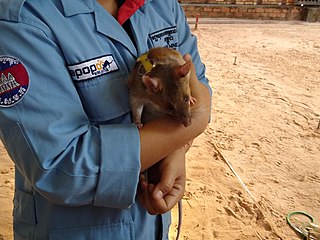
APOPO is a registered Belgian non-governmental organisation and US non-profit which trains southern giant pouched rats to detect landmines and tuberculosis. They call their trained rats 'HeroRATs'.
Golden West Humanitarian Foundation is an American Non-profit (501C3) organisation that develops technology to address the technical limitations of humanitarian mine clearance. The Golden West Humanitarian Foundation is based in Woodland Hills, Los Angeles, California.
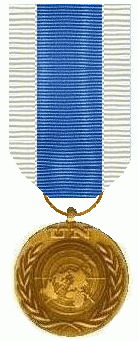
The United Nations Special Service Medal (UNSSM) is presented to personnel with 90 days of service with a United Nations mission not covered by a specific United Nations Medal. United Nations Headquarters service is not eligible.

Chut Wutty was a Cambodian environmental activist who was founder and director of the Natural Resource Protection Group (NRPG). He was best known as the country's most vocal critic of the military's alleged role in illegal logging conducted by companies granted land concessions in protected forests and related government corruption.
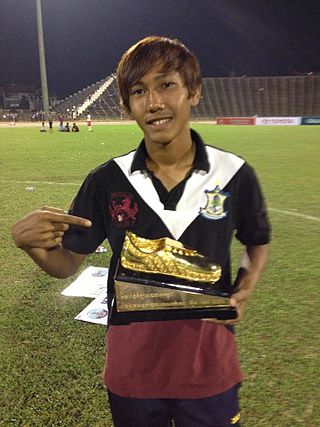
Chan Vathanaka is a Cambodian professional footballer who plays as a winger or a forward for Boeung Ket Angkor and for the Cambodia national team. He is considered as one of the greatest Cambodian player especially on international stage.
CMAC FC, is a football (soccer) club in Kampong Chhnang, Cambodia. It plays in the Metfone C-League, the top division of Cambodian football.

Cambodia–Israel relations are the official relations between Cambodia and Israel. Both countries established diplomatic ties in 1960. In 1972, Cambodia opened its embassy in Israel in Jerusalem. However, Israel cut its ties with Cambodia in 1975 due to the rise of the Khmer Rouge regime. Ties were restored in 1993.